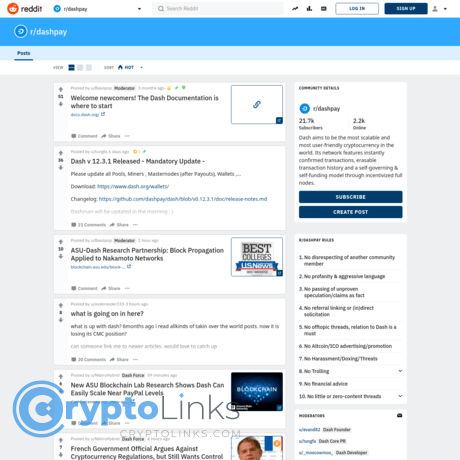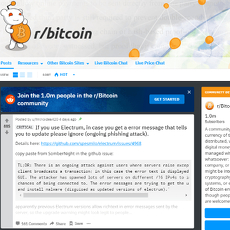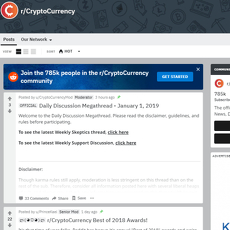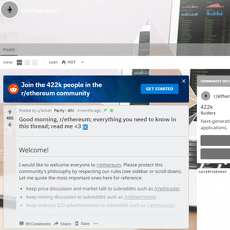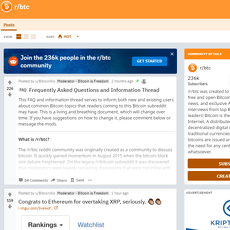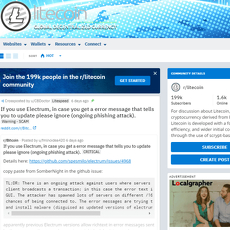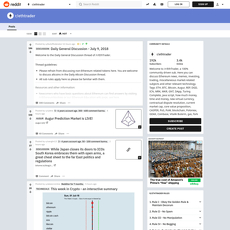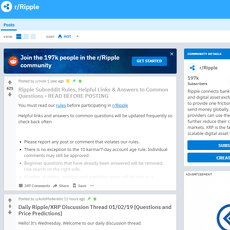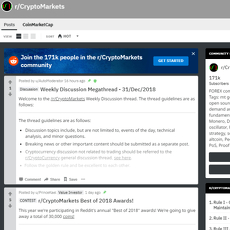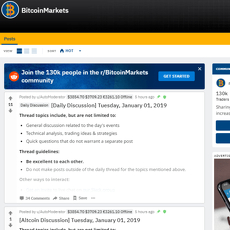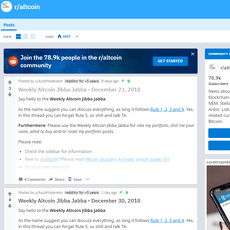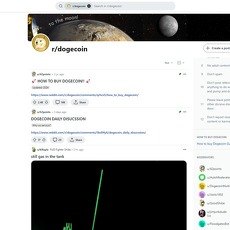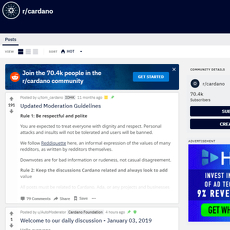r/dashpay Review
r/dashpay
www.reddit.com
r/dashpay Reddit review guide: everything you need to know
Is r/dashpay worth your time, or just another crypto echo chamber? If you want real Dash updates, practical tips, and honest community signal without wasting hours, keep reading.
I’ve spent a lot of time watching how r/dashpay works in the real world—who posts, what gets attention, and which threads actually help you send a payment, set up a wallet, track releases, or understand Dash Platform and DashPay without getting lost. Here’s a clear view of what’s useful, what to skip, and how to move faster than the average Reddit lurker.
Describe problems or pain
Let’s be real: Reddit can be a blessing and a mess at the same time. With Dash, the confusion multiplies because there are a few moving parts and similar names floating around.
- Dash vs. Dash Platform vs. DashPay usernames: Newcomers mix these up constantly. A wallet feature gets mistaken for a protocol feature, or a testnet update gets read as “mainnet live.”
- Outdated answers rank high: Reddit’s “Top” sorting often surfaces older posts. A 2021 tip might still show up first in 2025—even if the network behavior, fees, or wallet UIs changed.
- Noise and shilling: Some users push narratives or price talk without facts. It’s crypto; it happens. The trick is spotting verified sources quickly.
- “Official” vs. opinion: Without context, a strong opinion can look like a network fact. That’s risky when you’re deciding how to accept payments or secure funds.
- Critical details buried: Security basics like InstantSend, ChainLocks, or required confirmations for exchanges get scattered across comments, not headers.
This isn’t just a Dash thing. Reddit’s structure rewards engagement, not necessarily accuracy. Research from Pew Research shows plenty of social media users rely on platforms like Reddit for updates, but the quality varies by community and moderation. So the question isn’t “Is Reddit good?”—it’s “How do you extract value from this subreddit fast?”
Promise solution
Here’s the plan I’ll walk you through as we go:
- Map the subreddit: Who’s active, what threads matter, and how to spot official info at a glance.
- Search smarter: Exact keywords and filters that surface releases, governance details, and wallet fixes.
- Verify in seconds: Quick cross-checks with docs, GitHub, Discord, and trusted explorers.
- Action plan: A simple routine you can follow weekly so you never miss key updates.
- Clear answers: A short FAQ with straight, no-fluff explanations you can share with your team.
Who this guide is for
- Holders and users: Want to send/receive Dash reliably and keep up with network improvements.
- Merchants: Need to understand settlement speed, refunds, wallet choices, and basic risk management.
- Developers: Looking for the latest on Dash Platform, identity, and data contracts without chasing every channel.
- Crypto‑curious: Comparing Dash to other payment-focused coins and trying to find real, up-to-date info.
How I reviewed r/dashpay
I tracked release posts, dev comments, support threads, and recurring questions across months, focusing on what helps you actually get something done. That includes:
- Release and upgrade posts: Core version announcements, Platform devnet/testnet milestones, and wallet updates that affect daily use.
- Governance and proposals: Community discussions that influence funding, integrations, and ecosystem priorities.
- Support patterns: The most common wallet issues, InstantSend questions, fee confusion, and how people fix them.
- Source consistency: Which posts link back to docs, GitHub, or official channels—and which are just opinions.
During this, I paid attention to who shows up repeatedly with helpful answers, which usernames carry context (like maintainers, long-time contributors, or moderators), and how often the sub points readers to verifiable sources. Small signal, big difference.
Quick snapshot of the subreddit
r/dashpay is Reddit’s main Dash community hub. Here’s how it typically looks day to day:
- What it covers: Network releases, Platform/DashPay progress, governance proposals, wallet updates, merchant news, and user support.
- Post types you’ll see a lot:
- Release threads linking to GitHub or official notes.
- Governance debates on funding and priorities.
- Support Q&A like “Why is my InstantSend pending?” or “Which wallet is safest on Android?”
- Merchant stories and integration tips (POS, payment gateways, refunds).
- Community tone: More practical and technical than pure price talk. You’ll see skepticism, but low-effort FUD usually gets pushed down if mods and regulars are active.
- Moderation style: Generally pragmatic. Spam and obvious promos don’t last. Check the rules for what’s allowed before posting.
- Signal vs. chatter: Real updates tend to cluster around releases and governance cycles. In between, expect support threads and Platform curiosity. Sort by “New” to catch fresh news, and switch to “Top” (Week/Month) to see what the community found most useful recently—just watch the dates.
- How to spot “official-ish” content fast: Look for links to docs.dash.org, github.com/dashpay, and explorers. Users with technical track records and consistent sources are your north star.
“Reddit is great for discovery. Accuracy comes from verifying.” Treat r/dashpay as your first stop, not your final source.
If you’ve ever scrolled for 20 minutes and still weren’t sure what’s true, you’re not alone. Good news: you can fix that with a simple system. Want to know who runs r/dashpay, how “official” it is, and what you’ll find there before you even open Reddit? That’s next—let’s break it down cleanly.
What r/dashpay is, who runs it, and what you’ll find
r/dashpay is Reddit’s home base for Dash—the cryptocurrency, the network, and the evolving username layer people often call DashPay. It’s where practical users, developers, masternode owners, and merchants meet to swap updates, ask real questions, and pressure-test claims in public. Expect less price babble and more nuts-and-bolts: releases, governance votes, troubleshooting, and merchant adoption stories.
“Trust, but verify.” That’s the mindset that pays off in r/dashpay—spot breaking news fast, then cross-check before you act.
History and purpose in plain English
Dash has been around since 2014 (launched as XCoin, became Darkcoin, then Dash). The subreddit grew as a community noticeboard when a lot of crypto discussion still lived on forums. Over time, it settled into a focused role:
- Track real releases and upgrades from Dash Core and the Platform efforts (think InstantSend, ChainLocks, and the username/identity features often referred to as DashPay).
- Coordinate governance around treasury proposals and masternode votes—discuss the “why,” not just the “how.”
- Handle support in public so future readers can find fixes: wallet hiccups, stuck-looking payments, explorer checks, and merchant receipts.
- Show adoption progress with on-the-ground merchant news, especially from active regions where point-of-sale usage matters.
The purpose isn’t to be a glossy brochure. It’s to be a fast signal board with a memory. That’s why older threads still surface in searches and why you’ll see release notes linked to GitHub rather than vibe-only posts.
Mods, core dev presence, and how “official” it is
r/dashpay is community-moderated. You’ll see moderators keep the sub on-topic, remove obvious spam/scams, and nudge posts toward useful flairs. From time to time, Dash Core Group engineers or long-time contributors weigh in from personal accounts, especially on release threads or security clarifications. That said, it’s not a formal help desk, and it isn’t the only “official” channel.
How I keep it clean and credible:
- Check author history: click through to see if a poster has a track record with code, proposals, or support—drive-by claims get less weight.
- Look for primary links: real releases and security notes should reference GitHub, the official docs, or the blog/newsroom on dash.org.
- Expect consensus, not decrees: if it’s a major change, you’ll see the same information reflected across Reddit, docs, and developer channels.
In short, it’s “official enough” for awareness and context, but you should always verify details before upgrading nodes or moving funds.
Rules, flairs, and posting basics that save you time
The sidebar rules are straightforward: keep it Dash-focused, avoid spam/referrals, be respectful, and don’t pass speculation off as fact. Flairs help the sub stay scannable, and using them correctly gets you faster replies.
- Common flairs you’ll see (names sometimes change): Release, Governance/Proposal, Support, Merchant, Security, Dev.
- Title your post like a pro: “Wallet: Dash Core vX.Y.Z — InstantSend pending 15+ minutes (TXID inside)” gets help faster than “Help!!!”. Clear titles correlate with quicker responses in online Q&A communities—good labeling works across platforms, not just crypto. For general tips on asking better questions, I like the practical advice on the Stack Overflow blog.
- For support posts, include: wallet/app name and version, OS, the TXID, an explorer link, when it was sent, and where it’s headed (exchange, wallet, merchant).
- Search before posting: use Reddit’s search with keywords like “InstantSend,” “ChainLocks,” “Dash Platform,” “proposal,” or your wallet name. Sorting by Top (Month) or New often surfaces active fixes.
- No price talk in tech threads: it buries real answers and often gets removed.
One extra tip: if a mod pins a megathread (for a release or security topic), post inside it. The right eyes are already watching there.
Common content buckets: releases, proposals, support, merchant news
Releases
You’ll typically see posts minutes to hours after a GitHub tag lands. Solid release threads link to:
- GitHub release notes and changelogs
- Upgrade guidance for nodes/masternodes and potential deadlines
- Security notes if anything is urgent or mandatory
Expect follow-up comments about upgrade experiences and edge cases. If a post lacks references, wait for corroboration.
Governance and treasury proposals
Masternode owners and proposers outline budgets, milestones, KPIs, and justification. Healthy threads include:
- Direct links to the on-chain proposal ID or recognized voting portals
- Past performance or deliverables if it’s a renewal
- Constructive pushback on scope and accountability
If you’re evaluating, look for specific outcomes, not just vision. Screenshots and public repos are a plus.
Support
Wallet hiccups, exchange deposits, and “is this stuck?” posts show up daily. The best-resolved threads share:
- TXID + explorer link so others can check InstantSend locks, ChainLocks, and confirmations
- Exact wallet version and platform
- What was already tried (rescan, reindex, node upgrade, network status)
Community answers frequently reference the official docs and explorers—use those links to learn as you fix.
Merchant news
Posts highlight new stores, regions ramping up, or point-of-sale setups. Credible posts usually include:
- A receipt photo or POS screen showing Dash
- Location details or a website menu with a Dash option
- Sometimes a short video of the transaction speed (InstantSend is a favorite demo)
Treat single-photo posts without details as “unverified” until someone corroborates.
One last context point: Reddit is where a lot of crypto users first encounter breaking news; broader research on social platforms shows people do look to Reddit for timely updates, but verification still matters. If you want a quick primer on how many Americans use Reddit or view it as a news touchpoint, Pew Research has ongoing summaries you can scan here: Key facts about Americans and Reddit. Keep that “fast but verify” mindset and you’ll do well.
Ready to turn this into results instead of just scrolling? Up next, I’ll show you exactly which r/dashpay threads to follow, how to filter for real signal, and the search keywords that surface answers in seconds. Want the shortcuts?
How to get real value from r/dashpay
I treat r/dashpay like a toolkit, not a time sink. When you know which threads to follow, how to search, and how to fact-check quickly, the sub turns from “another crypto rabbit hole” into a practical feed that actually saves you time.
"Signal beats noise when you know what to ignore."
Here’s the simple, repeatable system I use each week to stay on top of releases, governance, and real issues—without doom-scrolling.
The threads worth following (releases, governance, security updates)
I don’t read everything. I watch for a few high-value post types that consistently move the needle:
- Release posts — Titles usually include something like “[Release] Dash Core vX.Y.Z” or “Platform testnet update”. These matter because they signal mandatory wallet/node upgrades, feature toggles, or bug fixes. Open them, skim the changelog, and note any “mandatory” language.
- Governance proposals — Look for “[Proposal]” or “Funding” posts. Scan for:
- Clear deliverables, timelines, and KPIs
- Links to on-chain proposal IDs and public repos
- Past performance if the proposer is returning
Well-structured proposals make it easier to judge if they’re worth your attention—or comments.
- Security or network notices — Phrases like “spork activated”, “chain lock issue”, or “mandatory upgrade” are your cue to read closely and verify with official sources (more on that below).
- Merchant and wallet support threads — Real-world stories about POS setups, payment hiccups, or integration updates. These surface common mistakes with addresses, memos, and InstantSend that you can avoid.
Bonus: subscribe to r/dashpay’s RSS feed (/r/dashpay/.rss) in your reader so you never miss release posts.
Search and filter tricks: new vs. top, week vs. month, and keywords that work
Reddit’s default feed buries useful posts. I use a simple filter routine that aligns with how people actually find information online. Nielsen Norman Group’s research on search behavior shows users scan results quickly and lean on clear labels—so give yourself labels worth scanning.
- For fresh status: open New. Great for support and breaking changes.
- For proven signal: open Top — This Month. You’ll catch the best releases, updates, and long-form discussions without old noise.
- Use power keywords: try combinations like:
- release, mandatory, upgrade, bug
- proposal, governance, funding, deliverables
- InstantSend, ChainLocks, testnet, username, wallet
- Target titles only: in Reddit search, add title:release or title:proposal to reduce noise.
- Google it faster: use site search in one click:
- site:reddit.com/r/dashpay release
- site:reddit.com/r/dashpay proposal
- Filter by flair when available on desktop: it’s the quickest way to isolate releases, support, or proposal threads. On mobile, switch to “Card” view or use a browser.
Two-minute routine that works: open “Top — Month,” run one Google site search for “release,” then check “New” for anything urgent. Done.
How to ask for help and actually get answers
Most unanswered posts fail for one reason: not enough context. Make it easy to help you in a single scroll.
- Use a clear title: “InstantSend stuck on Android vX.Y — TX shows unconfirmed” beats “Help pls.”
- Include these details in the body:
- Wallet/app and version (e.g., Android, iOS, Dash Core, hardware wallet)
- OS and phone/Desktop model
- Exact error text, if any
- TXID or shortened address (first/last 6 chars)
- What you already tried (rescan, reindex, network switch, different Wi‑Fi)
- Never share seed phrase, private keys, or full xpub. Crop screenshots to hide sensitive data.
- Add a link to the transaction on a public explorer (see verification section below). Helpers can debug 10x faster with a TXID.
- Post at reasonable hours and reply quickly to follow-ups. Threads with responsive OPs get solved more often.
- Tag solutions in an edit once fixed. Future readers will thank you—and you’ll get better help next time.
Example template you can copy:
Title: “InstantSend pending on iOS vX.Y — TXID included”
Body: Wallet: Dash Wallet iOS vX.Y, iPhone 13, iOS 17.0. Issue: payment shows ‘pending’ for 3+ minutes. Tried toggling mobile data/Wi‑Fi and app restart. TXID: [link]. Address ends with ...3fA. Any known issues today?
Verifying info: cross-checking with docs, GitHub, Discord, and explorers
Reddit is a great starting point, not the final word. I run this quick verification playbook whenever I read a claim about performance, fees, releases, or security.
- Docs: for features, security, and terminology, check the official documentation:
- docs.dash.org — the canonical source for Dash Core, Platform concepts, and guides
- GitHub: for releases and fixes, confirm on the official org:
- github.com/dashpay — look at release tags, changelogs, and commit timelines
Tip: legit releases include signed binaries and release notes. If a Reddit post says “mandatory update,” the corresponding tag and notes should exist here.
- Explorers: for any transaction claim, use a neutral or well-known explorer:
- Blockchair (Dash)
- Chainz Cryptoid (Dash)
Check: InstantSend/ChainLocks status (where displayed), confirmations, and timestamps. If someone says “fees spiked,” compare average fee per byte across multiple transactions the same day.
- Discord and official channels: for real-time clarifications, find links via:
- dash.org/community — official hub linking to Discord and other channels
If a post mentions a spork activation or network event, you’ll usually see confirmations or pinned notes in official channels.
- Governance sources: when a proposal is discussed on Reddit, verify it on-chain or via established dashboards:
- dashcentral.org — commonly used to track proposals, comments, and funding status
- Common-sense checks:
- Extraordinary claims need a link. No link, no trust.
- Screenshots can be out of date—match dates/times against explorer data.
- Personal anecdotes aren’t network facts. Verify with public metrics.
If you’ve ever felt the stress of “who do I believe,” this process lowers the heart rate. In under two minutes, you’ll know whether to act, comment, or move on.
Ready for the piece most people get wrong? Up next I’ll explain DashPay the way Reddit questions actually frame it—what it is, what it isn’t, and how it connects to usernames, InstantSend, and ChainLocks. Curious how it really works under the hood without the jargon?
DashPay explained for Reddit readers (no fluff)
I keep seeing the same confusion on r/dashpay: “Is DashPay a wallet? A username system? The thing that makes Dash instant?” Here’s the clean version you can trust, without the buzzwords.
“Great crypto UX isn’t about hiding the blockchain. It’s about making people forget they’re touching one.”
How DashPay works
Think of Dash in two layers:
- Layer 1 (Dash Core): UTXO blockchain where funds actually move. This is where InstantSend and ChainLocks live.
- Layer 2 (Dash Platform): A decentralized identity and data layer operated by masternodes. It adds usernames, contact requests, and app data via components like DPNS (Dash Platform Name Service), DAPI (Dash API), and Drive (state storage).
DashPay is the user-facing experience built on Dash Platform. It lets you register a unique username, send contact requests, and pay people from your contact list without copy-pasting addresses. Under the hood, your wallet still uses L1 addresses and signatures; Platform only stores identity and relationship data.
Here’s a real-world flow in simple terms:
- You claim @alice via DPNS on Platform. That creates a decentralized identity and links it to keys in your wallet.
- Bob searches @alice through DAPI, sends you a contact request, and your wallet stores the relationship on Platform.
- When Bob pays you, his wallet derives a fresh L1 address for you behind the scenes and locks the transaction via InstantSend in ~1–2 seconds. No manual address sharing, less UX friction, more safety.
Key point: DashPay doesn’t move your coins. It organizes who you’re paying and how your wallet negotiates fresh addresses, while L1 does the secure, fast settlement.
Useful references if you want to go deeper and verify:
- Docs hub: docs.dash.org
- Platform code: github.com/dashpay/platform
- Core releases: github.com/dashpay/dash/releases
- DIPs (design specs): github.com/dashpay/dips
What you can actually do with DashPay today
Depending on current network status (mainnet vs testnet availability for Platform features), your options fall into two buckets:
- Production, right now:
- Send/receive Dash with InstantSend and benefit from ChainLocks on L1.
- Use any reputable Dash wallet to pay merchants and peers using addresses or QR codes.
- Usernames and contacts via Dash Platform:
- If your wallet supports Platform on mainnet, you can register usernames and add contacts directly. Look for clear “Platform” or “Usernames” indicators in release notes.
- If mainnet usernames aren’t live in your wallet yet, you can still test the experience on testnet using SDKs and community builds linked from r/dashpay posts and the docs.
Quick ways to check the current state without guessing:
- Search r/dashpay for [Release], [Platform], or [RC]
- Compare claims with GitHub Platform repo and wallet release notes
- Confirm if your wallet added “Usernames” or “Contacts” tied to Platform in its latest changelog
If you’re a builder, the Platform SDKs let you register identities, submit data contracts, and manage contact requests programmatically. That’s how wallets create that “pay @username” flow you see in screenshots on the sub.
Common confusions on r/dashpay (InstantSend vs. ChainLocks vs. DashPay usernames)
- InstantSend
- What it is: Transaction-level lock by masternode quorums. Your payment is secured in ~1–2 seconds and broadcast as “locked.”
- What it’s not: A username system. It doesn’t manage identities or contacts.
- ChainLocks
- What it is: Block-level finality signals from masternode quorums. It hardens the chain against deep reorgs.
- What it’s not: A speed feature you press in the wallet. It’s automatic network security.
- DashPay usernames (on Dash Platform)
- What it is: Decentralized identities and human-readable names via DPNS; contact requests and metadata live on Platform.
- What it’s not: A settlement layer. Your coins never move on Platform; they move on L1.
More myths to skip:
- “Usernames make payments private.” No. They improve UX. Use standard privacy practices if you need them.
- “Funds are stored on Platform.” No. Platform stores identity and app data; funds live on the main blockchain.
- “DashPay replaces addresses.” It replaces seeing them. Your wallet still rotates fresh addresses under the hood.
Where to track Dash Platform and DashPay progress on Reddit
Reddit is great if you filter noise fast. Here’s the workflow that works:
- Go to r/dashpay and use the search bar with:
- flair: Release, Platform, RC, Testnet
- keywords: “DashPay,” “DPNS,” “Platform mainnet,” “usernames,” “DAPI”
- time filters: Top (Month) for stability, New for breaking changes
- Open posts that link to:
- Platform code commits or Core release notes
- Docs pages describing usernames, DPNS, and contact requests
- Wallet changelogs that explicitly state “Usernames/Platform support”
- Save a couple of recurring threads:
- Release/RC threads: for what’s actually shippable
- Platform updates: for username/contact rollout notes
- Support megathreads: to see real problems and real fixes
If you’re ever unsure, sanity-check in under a minute with:
Platform repo,
Core releases,
and a neutral explorer like Blockchair or Cryptoid.
If usernames make payments feel this smooth, how fast are regular Dash transactions really—and when do fees or confirmations still matter? I’ll show you what’s realistic next, with numbers you can test yourself.
Speed, fees, and reliability: quick facts and fixes
Nothing kills a checkout like a spinning wheel. Dash exists to make that moment disappear, not just be “faster than Bitcoin,” but fast and final. Here’s the no-fluff version I use in the real world—how long it takes, what you’ll pay, when to still care about confirmations, and how to fix a payment that looks stuck.
“Fast is only useful when it’s final.” That’s the entire point of InstantSend and ChainLocks.
How long does a Dash transaction take?
Two clocks matter: the InstantSend lock and the block confirmation. You’ll feel both in different scenarios.
- InstantSend (typical: ~1–2 seconds): Most wallet-to-wallet payments auto-lock in seconds using masternode quorums. Once locked, the network has effectively reserved those inputs, blocking double-spends while you walk away. That’s what retailers care about at the counter.
- First block (average: ~2.5 minutes): When the next block lands, ChainLocks signs it, giving block-level finality and reorg protection. That’s what exchanges and auditors care about.
Real examples I’ve seen repeatedly:
- Coffee purchase: Your payment shows “InstantSend lock” in ~1–2 seconds, the cashier prints the receipt, done. No waiting for a block.
- ATM deposit/exchange: The UI often credits on 1–2 blocks. Expect ~2.5–5 minutes unless they support InstantSend-based crediting.
- High-value escrow: Some counterparties still want 2–6 confirmations. Not a Dash limitation—just policy. Plan ~5–15 minutes for that workflow.
Reference: InstantSend and ChainLocks are native, not third-party add-ons. See the official docs: InstantSend and ChainLocks.
Fees, InstantSend, and when confirmations still matter
Dash is cheap to move, even when the market is busy. You don’t need to think about fee markets like you do on Bitcoin or Ethereum.
- Typical wallet fee: ~0.00001–0.0001 DASH per transaction. That’s usually under a cent to just a few cents depending on price and wallet defaults.
- InstantSend is included: You don’t “pay extra” for InstantSend. If your wallet supports it (most do), the lock is automatic.
- When to still care about confirmations:
- If an InstantSend lock doesn’t appear: Treat it like a normal crypto payment and wait for 1 confirmation (~2.5 minutes).
- Exchange deposits / brokerage apps: Follow their posted confirmation requirement. Many credit on 1–2 blocks thanks to ChainLocks.
- Very large transfers / compliance-heavy operations: Expect a set confirmation policy (2–6). It’s about risk control, not network ability.
Security basics: ChainLocks, reorg protection, and best practices
Dash security hinges on two layers working together:
- InstantSend locks use long-living masternode quorums (LLMQs) to lock your transaction inputs within seconds, shutting down double-spend attempts while the payment is still “in flight.”
- ChainLocks signs the first-seen block with a quorum signature, preventing reorganizations. In practice, once the first block is signed, that history is final for your transaction’s block. See docs: ChainLocks explained.
Practical habits I stick to:
- At the point of sale: Verify the “InstantSend lock” indicator in the wallet or POS. If it shows locked, you can confidently hand over goods/services.
- For accounting: Reconcile on the first ChainLocked block. That’s your clean, auditable checkpoint.
- For high-value transfers: Agree up front on confirmation policy. Don’t let policy mismatches slow you down.
Troubleshooting: when a payment seems “stuck” and what to check
If you see “pending” longer than a few seconds or you didn’t get an InstantSend lock, walk through this fast checklist.
- Step 1 — Confirm broadcast:
- Copy your TXID and check at least two explorers:
Blockchair (Dash) and
CryptoID Dash.
- If the TX isn’t visible, your wallet may not have broadcast. Hit “resend/broadcast,” ensure you have internet, and try again.
- Copy your TXID and check at least two explorers:
- Step 2 — Look for the InstantSend lock:
- Most explorers show an “InstantSend” or “IX” flag. If present, you’re good—treat it as settled for retail.
- No lock? It’ll still confirm in the next block. Just wait ~2.5 minutes. Some rare edge cases (very large input counts or older wallet software) can skip locking.
- Step 3 — Sanity checks on the sender’s wallet:
- Outdated app: Update your Dash wallet to the latest version to ensure LLMQ InstantSend compatibility.
- Clock or network issues: Phones with wrong time or spotty connections can lag. Toggle airplane mode, re-open the app, and re-broadcast.
- Unusually low fee (legacy settings): If a custom fee was set below network minimum relay, some peers ignore it. Use the wallet’s default fee and rebroadcast.
- Step 4 — Receiver-side refresh:
- Ask the receiver to refresh their wallet, switch networks (Wi‑Fi/cellular), or check the TXID on an explorer rather than the in-app list.
- If the receiver is a POS app, confirm they accept InstantSend locks; some POS systems only update on block confirmation by policy.
- Step 5 — Fallback: wait one block
- If there’s no InstantSend lock and you’ve verified the TX is broadcast, waiting for one ChainLocked block gives you production-grade finality.
Pro tip: If you process many small payments (e.g., a café), ensure your POS shows the InstantSend lock state clearly. That one UI signal prevents awkward “did it go through?” moments.
I’ve got a short list of places to validate these behaviors (docs, explorers, and support channels) that I cross-check every week. Want to see which ones I actually trust—and what I pair with Reddit to keep the signal high and the noise out?
Pros, cons, and smart alternatives to pair with r/dashpay
If you use r/dashpay with intent, it’s a strong pulse-check for real Dash updates, live support, and governance context. Here’s where it shines, where it slips, and the exact places I cross-check so you don’t waste time—or miss something important.
What r/dashpay does really well
- Real-time release signals and clarifications. New Dash Core and Platform releases often hit r/dashpay quickly, and the top comments usually surface subtle upgrade notes (e.g., “backup before you migrate,” “reindex needed,” or “watch for platform-specific flags”). That saves you from parsing every line of a changelog before you update.
- Governance visibility without spreadsheets. Proposal threads make the trade-offs obvious. You’ll see pros/cons, prior performance receipts, and community memory in one place—much faster than reading proposals cold.
- Incident and maintenance threads that actually help. When an exchange pauses deposits, a wallet hiccups, or a service updates Dash support, there’s usually a same-day thread. The comments often include workarounds and confirmations from multiple regions, which is gold when you’re trying to decide whether to wait or escalate.
- Quick triage for common wallet issues. If someone says “InstantSend didn’t lock” or “balance not showing,” the first helpful replies usually request the TXID, wallet version, and screenshots. That nudges the discussion into something actionable instead of guesswork.
- Merchant and community wins. Adoption snapshots show how people are actually using Dash—in-store, online, and cross-border. These are useful for sales pitches, investor decks, and sanity checks.
- Searchable history. Old threads capture why something changed (fees, InstantSend defaults, ChainLocks behavior, Platform milestones). When you’re uncertain, reading the original conversation beats rumors.
Gaps and gotchas to watch for
- It’s not an official help desk. Helpful? Yes. Guaranteed? No. If you need a fix today, always pair Reddit with official docs and repos below.
- Version drift is real. Advice from last year may clash with today’s wallet, node, or Platform state. I always ask: “What version? Mainnet or testnet? Exact error?”
- Early-vote bias. The first few upvotes can tilt what you see and what you think is consensus. That’s not just a hunch—research in Science (Muchnik, Aral, Taylor, 2013) showed early upvotes amplify popularity regardless of merit. I routinely check “new” and read a few dissenting comments before I decide.
- Noise spikes during price swings. Expect more hype and generic crypto cross-talk when markets move. I pre-filter with search keywords like “release,” “InstantSend,” “ChainLocks,” “proposal,” “Dash Platform,” “outage,” and “maintenance.”
- Proposal politics. Self-promotion happens. Look for delivery history, milestones shipped, and independent confirmations. If it’s all promises and no receipts, skip.
- External links can be sketchy. Never click link shorteners or random forms. If it’s not a known domain (docs, GitHub, explorers, official downloads), assume it’s risky.
Extra resources I trust
Bookmark these so you can confirm anything you read on r/dashpay in under a minute.
- Official docs: https://docs.dash.org/ (Core, Platform, DashPay concepts, setup guides)
- Dash Core releases: https://github.com/dashpay/dash/releases
- Dash Platform releases: https://github.com/dashpay/platform/releases
- Official downloads: https://www.dash.org/downloads/ (Core wallet and verified binaries)
- Governance tracking: https://www.dashcentral.org/ (proposal overviews, history, voting)
- Community hub: https://www.dash.org/community/ (links to forum, chat, and social)
- Block explorers: Use your preferred Dash explorer to verify TXIDs, confirmations, InstantSend lock status, and ChainLocks indicators.
Want the full list I keep next to my browser for deeper checks?
Open the extended resource list.
Red flags: hype posts, low-effort FUD, and how I filter them out
- Urgency without proof. “Emergency! Devs quit!” with no commit history or release references. My fix: check the last commits on dashpay/dash and dashpay/platform before reacting.
- Screenshots as “evidence.” If there’s no TXID, no version, no reproducible steps, it’s noise. I reply once asking for TXID + wallet/version + network. No details, no attention.
- Link shorteners and drive-by domains. I never click. If it matters, there’s a docs.dash.org or GitHub link somewhere. If not, pass.
- Price bait. “100x soon” or “zero by Friday” isn’t a network signal. I filter by keywords: “release,” “ChainLocks,” “platform,” “governance,” “upgrade,” “maintenance.”
- One-day accounts with loud claims. I click the username, check history, then move on. If it’s legit, someone reputable usually echoes it with sources.
- Old fixes for new builds. If a comment says “just delete your wallet.dat” or “disable locks,” I stop there. I only follow steps that match the current docs and release notes.
My 30-second filter: “Two links or it didn’t happen.” I want a docs page or a GitHub issue/release plus an explorer or official download. If a post can’t clear that bar, it doesn’t shape my decisions.
Want my plug-and-play setup to keep r/dashpay signal high and your time investment low? Next, I’m sharing the exact 5-step plan I use—plus straight answers to the most asked questions. Which one do you want solved first: InstantSend timing or how to verify Platform progress without reading code?
Your action plan + FAQ
I want you to get in, get value, and get out without wasting time. Here’s a simple plan that works, plus straight answers to the questions people keep asking in r/dashpay.
5-step starting plan for r/dashpay
- Follow the right threads automatically. Subscribe and filter by flairs like Release, Security, Governance, and Support. On desktop, use the subreddit’s flair filters so you don’t drown in unrelated chatter.
- Use search that actually surfaces signal. Sort by new for breaking changes; sort by top: week to see what the community validated. Useful queries:
“release” “rc” “Core v” “Platform v” “ChainLocks” “InstantSend” “proposal” “treasury”.
- Save a verification routine. Before acting on any claim, open two tabs:
docs.dash.org and github.com/dashpay. If it’s a wallet or exchange claim, add the relevant explorer (Blockchair or your preferred Dash explorer) to check the tx or address.
- Ask for help the right way. When posting, include wallet/app version, txid, whether InstantSend locked, and screenshots (mask addresses). You’ll get a useful answer fast instead of a guessing contest.
- Bookmark one sanity thread and one status page. Keep a recent release thread for comments from devs/mods, and bookmark the official docs for Platform and Core so you can confirm what’s live vs. in testing.
Quick FAQ (straight answers)
How does DashPay work?
Short version: DashPay is a data contract on Dash Platform that lets users create decentralized identities and usernames, share contact requests, and send to contacts instead of raw addresses. Identities and contact info live on Platform; payments still settle on the Dash Core chain. Under the hood, Platform uses masternode quorums and data contracts to store identity/contact state, and apps talk to it through DAPI. It’s identity-based UX on top of the same fast L1 payments. Official docs: docs.dash.org (see the Platform and Identity sections).
How long does a Dash transaction take?
- InstantSend: Typical autolock in ~1–2 seconds. For most person-to-person and many merchant payments, funds are spendable right away once you see the InstantSend lock.
- Block confirmation: Dash’s target block time is ~2.5 minutes. When your tx is mined into a block, ChainLocks kicks in to harden finality against reorgs using masternode quorums. That’s why many services treat 1 confirmation as final on Dash.
- When confirmations still matter: Some exchanges, custodians, or compliance tools ignore InstantSend and require 1–2 block confirmations. Check their policy—it’s not the network, it’s their risk settings.
Is the subreddit “official”?
It’s community-run with active moderators. You’ll often see Dash Core/Platform contributors commenting, typically with flairs like Dev, DCG, or similar. Treat it as a high-signal community hub, not a single source of truth. Cross-check releases on GitHub: Core and the Dash Platform repos under dashpay.
How do I verify claims I read in a post?
- Releases: Confirm the exact tag and notes on GitHub. If it’s not on the official repo, treat it as unconfirmed.
- Platform/DashPay status: Check the Platform docs and most recent release notes. If a feature is “coming soon,” it will be listed in issues/milestones.
- Performance/security claims: Look for references to DIPs (e.g., LLMQ-based InstantSend and ChainLocks) and documentation. If there’s no source, ask for one.
- Transactions: Paste the txid into an explorer and check fields like InstantSend/IS lock, confirmations, and inputs. If your wallet supports it, the transaction detail will also show if an InstantSend lock was received.
Who should I follow on r/dashpay?
- Accounts with Dev/DCG flairs discussing Core or Platform issues.
- Release posters who consistently link to GitHub tags and docs.
- Long-time community helpers who provide tx-level diagnostics and link sources. Look for users who cite docs or explorers instead of hot takes.
How do I report scams or shady promotions?
- Use Reddit’s Report button and choose Scam or Spam.
- Message the mods via Modmail if it’s urgent or involves phishing and fake support.
- Never share your seed phrase, private keys, or recovery words. No legit support will ask.
- Warn others with a comment that includes a source (screenshot, link) so mods can act quickly.
What’s the typical fee?
Fees are usually a tiny fraction of a cent in DASH terms for standard transactions. If you see noticeably higher fees, you’re probably on a third-party wallet with a fixed fee or an exchange withdrawal—check the fee setting or use a wallet that supports dynamic Dash fees.
Why didn’t my payment InstantSend lock?
- Your wallet might not support InstantSend or autolocks—update or use a Dash-native wallet.
- Your inputs might be unconfirmed or the wallet is using a backend node that’s out of sync.
- Some services disable InstantSend on withdrawals; you’ll get a normal on-chain tx instead.
- What to do: share the txid, wallet/app version, and a screenshot in a support thread. Check explorers for IS lock status and confirmations.
How is security handled at the network level?
Dash uses Long Living Masternode Quorums (LLMQs) for InstantSend and ChainLocks. InstantSend locks transactions in seconds; ChainLocks signs the first block containing your tx, giving strong reorg protection at 1 confirmation. See Dash Improvement Proposals and docs for the mechanism details: docs.dash.org.
Tip: On merchants that understand InstantSend, you can treat the payment as final when the IS lock appears. For exchanges, follow their confirmation policy even if you see an IS lock.
Conclusion
Use r/dashpay like a pro: track releases and security threads, search smart, verify with the docs and GitHub, and ask focused questions with enough detail to help others help you. If you stick to that plan, you’ll get the real updates, the right fixes, and none of the noise.

